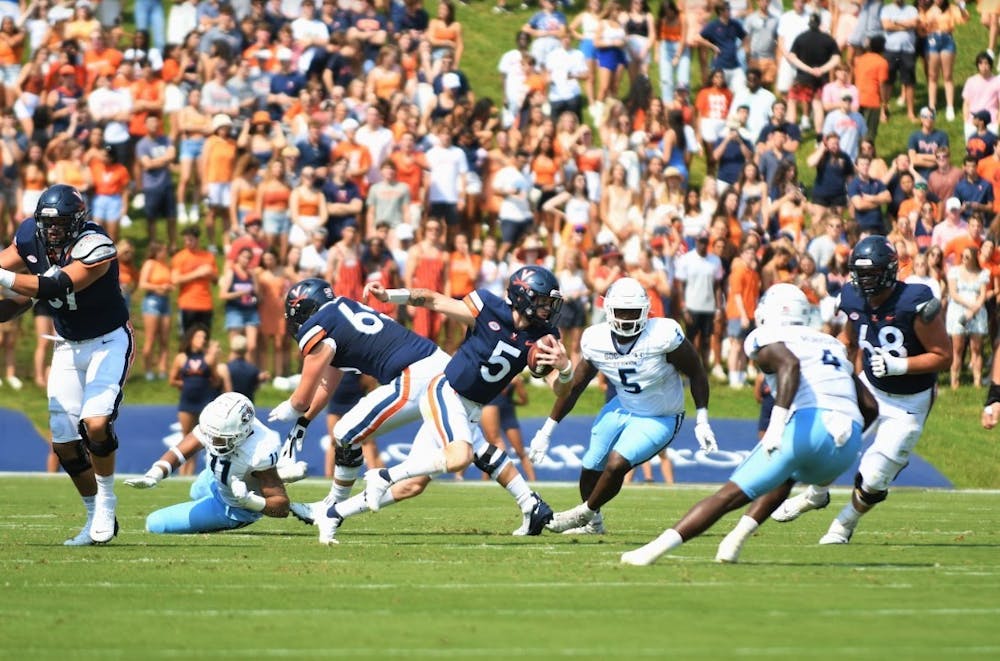During the reign of former Coach Bronco Mendenhall, Virginia football consistently possessed one of the best offenses in the country. Mendenhall took over a team that scored in the bottom quarter of all FBS teams in 2015 and improved its output nearly every year until it peaked as the 21st highest scoring unit in the country last year.
The 2021 Cavalier offense was lethal. Mendenhall ran an Air Raid offense that focused around throwing the football to playmakers in space and stretching the field to create holes in the defense. Quarterback Brennan Armstrong, then a junior, racked up some of the best passing stats in the country, and the team scored 34.6 points per game.
Despite the explosive offense, Virginia’s defense was horrid and the team faltered down the stretch to finish with a record of 6-6. Mendenhall resigned after losing his fifth contest against Virginia Tech in six tries.
Enter Coach Tony Elliot. The former Clemson offensive coordinator developed a sterling reputation winning multiple national championships and developing future NFL quarterbacks like Trevor Lawerence. He brought with him a more pro-style offense than Mendenhall had run.
A year after being one of the top scoring teams in the country, the Cavalier offense has been dysfunctional during the team’s 2-2 start, averaging 18.2 points per game — 116th in the country. Armstrong has regressed below the mean, completing just 52.1 percent of his passes and failing to crack 1,000 passing yards through four games. This begs the question — what’s wrong with this offense?
The offensive line
Last winter, 2021’s rock solid offensive line followed Mendenhall out. Second-team All-American center Olusegun Oluwatimi and tackles Ryan Swoboda and Bobby Haskins transferred, while guards Chris Glazer and Ryan Nelson graduated.
Only two of the unit replacing these guys played on the Cavalier line in 2021 – although neither played a significant role. The new five had not played at all together before practice in April and most are average or below talents.
As expected, the line has so far played poorly. Armstrong has taken 12 sacks in four games, the seventh-most of any Power Five quarterback. No Power Five squad has allowed its quarterback to be sacked at a higher rate than Virginia’s 11.22 percent.
This has caused a number of problems for the offense. Armstrong has been so constantly under pressure that he has rarely been able to make one or two reads before he has to break the pocket to scramble. The repeated hits the gunslinger is taking from constant pressure and scrambling leaves him open to injury, which could prove catastrophic for Virgnia’s offense.
Another issue of a weak offensive line is that defenses need to send extra pass rushers much less often. Getting consistent pressure with only three or four rushers allows the rest of the defense to focus on coverage. Against the Cavaliers, teams have rarely blitzed, instead electing to rush four most of the time and leave seven back to gum up throwing windows.
New scheme issues
Any offensive scheme is supposed to maximize the team's output by leveraging players’ strengths and papering over their weaknesses. Mendenhall countered deficiencies in running back and blocking talent by letting his quarterbacks throw the ball quickly to playmakers in space or tuck it and run.
Meanwhile, at Clemson, Elliott had the luxury of NFL talent at every position — therefore, he ran an NFL-style system. Elliott asks his quarterbacks to go through multiple reads on more complex routes before the play breaks down. Being forced to read the defense more, in tandem with teams dropping back more coverage, has made Armstrong’s life tough.
Aside from poor stats, the quarterback has failed to deliver in the clutch. Against Syracuse, Armstrong twice stared down and threw to covered targets on key fourth downs instead of passing to open receivers. The second of those incompletions ended the game.
Virginia has been best when letting Armstrong run the offense quickly out of the shotgun with a healthy mix of air raid and pro concepts, getting the ball quickly to receivers in space. Elliott would do well to include more of this in his gameplanning.
Bad execution
All that being said, the Virginia offense would be in a much better spot if the players were committing fewer errors. So far, the team has committed more turnovers per game versus last year, 2.5 to 1.5. While Armstrong has had to throw into tighter windows this year, his interceptions against Syracuse and Richmond were easily avoidable, and the pair he threw at Illinois were downright inexcusable.
Penalties have also killed the team. The offense is commiting 7.8 per game for 68.8 yards, up from 6.4 and 56.8 last year. Lots of these have been calls against the offensive line, like holding or false starts.
Drops, fumbles and other avoidable miscues have plagued the Cavaliers, too. Formerly reliable wideouts junior Dontayvion Wicks and senior Billy Kemp can’t hold onto the football, with a fumble and a few uncharacteristic drops each. Most schematic and talent deficiencies Virginia has faced this season could be fixed if the team played cleaner.
This season is looking bleak for Virginia football — there may not be a bowl game come December, and if there is, not a prestigious matchup. However, it’s important to remember that under Mendenhall, the Cavaliers only broke through to win a bowl game in year three after two fairly unsuccessful seasons. Elliott has time to improve the program and bring offensive fireworks back to Charlottesville — it just may not be this year.







